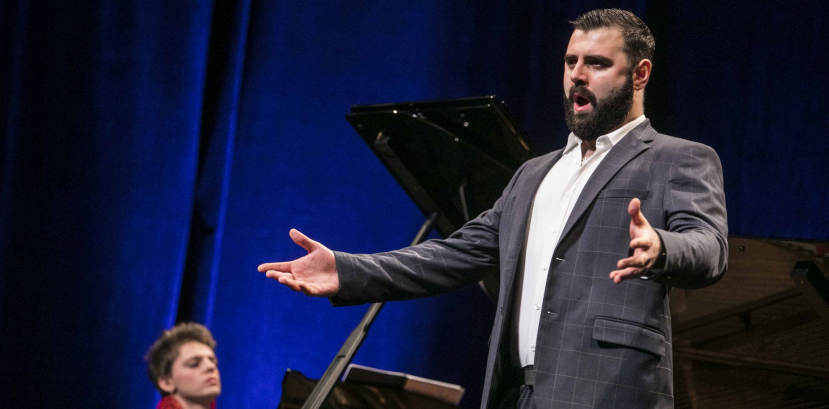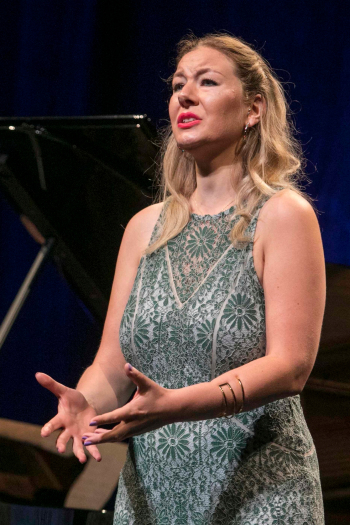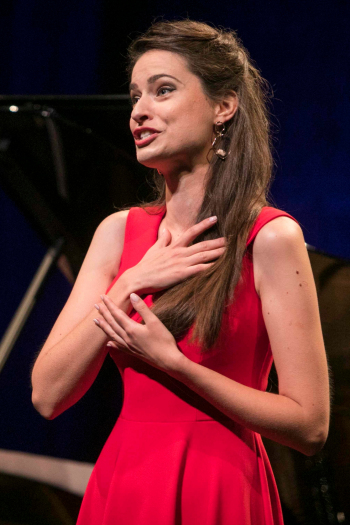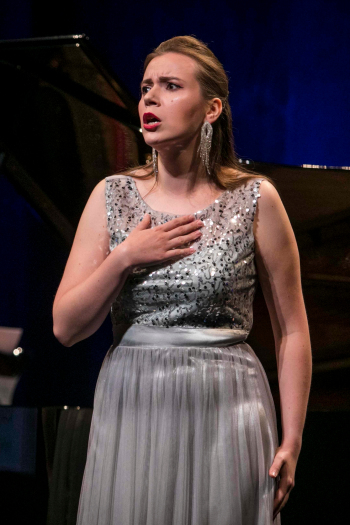Reviews written by Barbara Zamek of auditions of participants in the 1st stage of the 19th Ada Sari International Vocal Artistry Competition.
Wiktor Kowalski - baritone
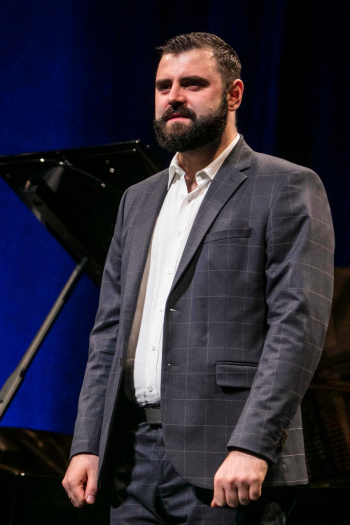 Baritone Wiktor Kowalski opened the second day of auditions. He first performed R. Leoncavallo’s aria "Si può? Si può?", showing sensitivity and musicality. His voice has a beautiful timbre, but it sounds a bit nasal and not quite at ease. The second aria presented by the soloist was "Rivolgete a lui lo sguardo" by W. A. Mozart. He sang it gracefully, interpreting the text perfectly.
Baritone Wiktor Kowalski opened the second day of auditions. He first performed R. Leoncavallo’s aria "Si può? Si può?", showing sensitivity and musicality. His voice has a beautiful timbre, but it sounds a bit nasal and not quite at ease. The second aria presented by the soloist was "Rivolgete a lui lo sguardo" by W. A. Mozart. He sang it gracefully, interpreting the text perfectly.
Maksymilian Skiba | baritone
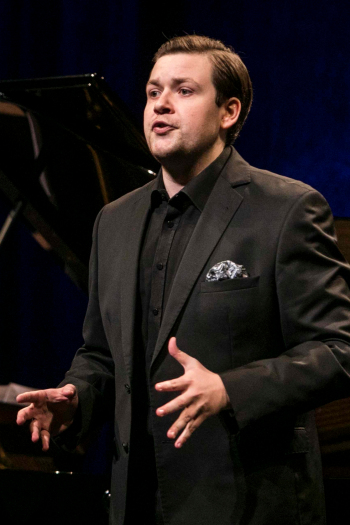 Baritone Maksymilian Skiba began his performance energetically with the aria "Donne mie, la fate a tanti" by W.A. Mozart. He has a light voice with a bright timbre, flawless diction and a lot of confidence on stage. As the second piece the Jury members chose S. Moniuszko’s song "Dziad i Baba" ("Old Man and Old Lady"). The soloist brilliantly recreated all the characters in terms of acting. The Old Lady had a screeching voice, The Old Man a deep and dark one, and Death mocking and giving one the chills. The singer was pushing out some syllables too much, which at times led to a lack of legato.
Baritone Maksymilian Skiba began his performance energetically with the aria "Donne mie, la fate a tanti" by W.A. Mozart. He has a light voice with a bright timbre, flawless diction and a lot of confidence on stage. As the second piece the Jury members chose S. Moniuszko’s song "Dziad i Baba" ("Old Man and Old Lady"). The soloist brilliantly recreated all the characters in terms of acting. The Old Lady had a screeching voice, The Old Man a deep and dark one, and Death mocking and giving one the chills. The singer was pushing out some syllables too much, which at times led to a lack of legato.
Dominika Škrablová | mezzo-soprano
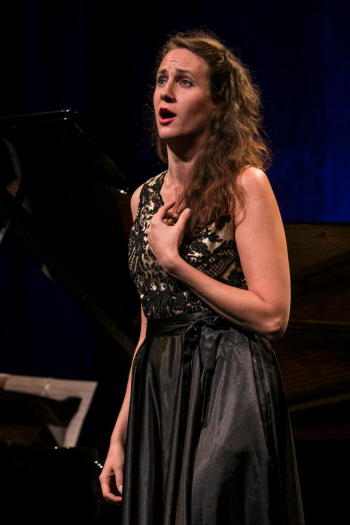 Czech mezzo-soprano Dominika Škrablová performed recitatives and arias "È destin, debbo andarmene… / Marcello mio" by R. Leoncavallo and "Ah scostati / Smanie implacabili" by W.A. Mozart. The soloist has an interesting timbre and sensitivity. She sang emotionally and with great commitment. She tried to lead the phrases beautifully, sometimes so much that the voice seemed to be slipping out of her control. At times it seemed out of tune, and the high register sounded sharp.
Czech mezzo-soprano Dominika Škrablová performed recitatives and arias "È destin, debbo andarmene… / Marcello mio" by R. Leoncavallo and "Ah scostati / Smanie implacabili" by W.A. Mozart. The soloist has an interesting timbre and sensitivity. She sang emotionally and with great commitment. She tried to lead the phrases beautifully, sometimes so much that the voice seemed to be slipping out of her control. At times it seemed out of tune, and the high register sounded sharp.
Karol Skwara | bass
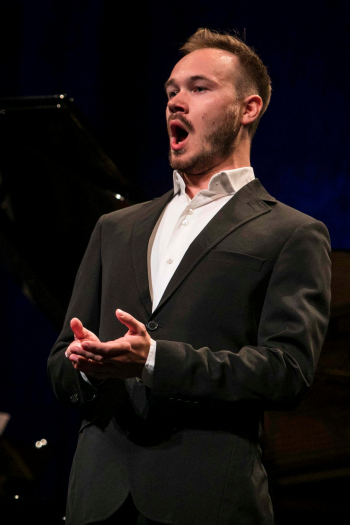 Bass Karol Skwara chose the aria "O Isis und Osiris" by W. A. Mozart as the first piece. He presented great pronunciation and clear diction. Even so, he sang rather monotonously and had problems with intonation at times. At the piano, Michał Biel led the musical phrases beautifully. The second aria "Un ignoto, tre lune or saranno" by G. Verdi, the singer performed much more freely. He built up tension and interpreted the text in an interesting way.
Bass Karol Skwara chose the aria "O Isis und Osiris" by W. A. Mozart as the first piece. He presented great pronunciation and clear diction. Even so, he sang rather monotonously and had problems with intonation at times. At the piano, Michał Biel led the musical phrases beautifully. The second aria "Un ignoto, tre lune or saranno" by G. Verdi, the singer performed much more freely. He built up tension and interpreted the text in an interesting way.
Dominika Stefańska | mezzo-soprano
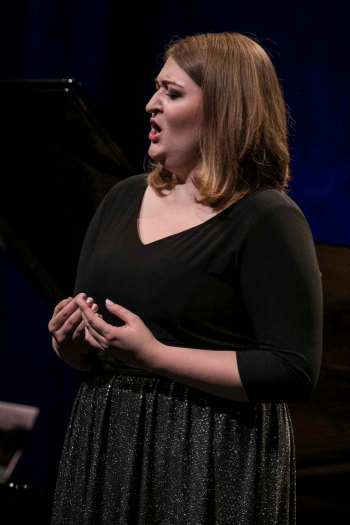 Mezzo-soprano Dominika Stefańska started her performance with recitative and aria "Maledetta fortuna / Amore nel mio petto" by J. Haydn. She delivered the text in the recitative excellently, and in the aria she showed interesting dynamic differences. As her second piece, the Jury members chose W.A. Mozart’s aria "Torna di Tito a lato". Both pieces were interpreted by the soloist in an elegant, thoughtful way. Her voice sounded strong and warm, but also a bit strained at times.
Mezzo-soprano Dominika Stefańska started her performance with recitative and aria "Maledetta fortuna / Amore nel mio petto" by J. Haydn. She delivered the text in the recitative excellently, and in the aria she showed interesting dynamic differences. As her second piece, the Jury members chose W.A. Mozart’s aria "Torna di Tito a lato". Both pieces were interpreted by the soloist in an elegant, thoughtful way. Her voice sounded strong and warm, but also a bit strained at times.
Jakub Szmidt | bass
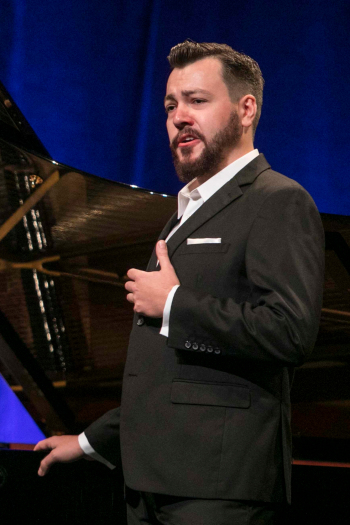 Bass Jakub Szmidt started his performance with P. Tchaikovsky’s song "Blogoslavlaju vas lesa". He has a warm, round sounding voice. He conducted legato phrases beautifully. In the second aria, "O Isis und Osiris" by W.A. Mozart, the singer presented the text in an interesting way, although the German pronunciation was not perfect. The soloist is very good at interpreting and has great sensitivity. His voice does not sound completely at ease and there is sometimes too much vibrato in it.
Bass Jakub Szmidt started his performance with P. Tchaikovsky’s song "Blogoslavlaju vas lesa". He has a warm, round sounding voice. He conducted legato phrases beautifully. In the second aria, "O Isis und Osiris" by W.A. Mozart, the singer presented the text in an interesting way, although the German pronunciation was not perfect. The soloist is very good at interpreting and has great sensitivity. His voice does not sound completely at ease and there is sometimes too much vibrato in it.
Katarzyna Szymkowiak | mezzo-soprano
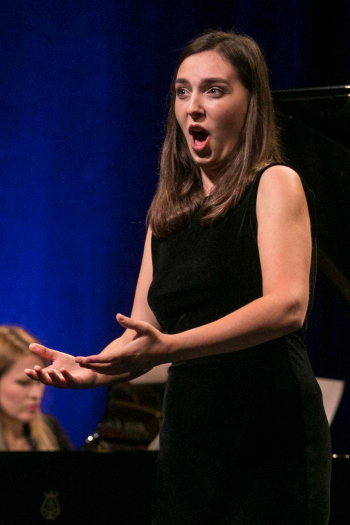 Mezzo-soprano Katarzyna Szymkowiak presented very precise coloratures in A. Vivaldi's aria "Armatae face et anguibus". She sang with great commitment, interpreting the text perfectly. Each emotion was communicated clearly, thanks to both an explicit pronunciation and adequate gestures. In the next aria "Deh per questo" by W.A. Mozart, the soloist, had to deal with longer phrases. Her voice was less even when singing legato, and sometimes it sounded out of tune.
Mezzo-soprano Katarzyna Szymkowiak presented very precise coloratures in A. Vivaldi's aria "Armatae face et anguibus". She sang with great commitment, interpreting the text perfectly. Each emotion was communicated clearly, thanks to both an explicit pronunciation and adequate gestures. In the next aria "Deh per questo" by W.A. Mozart, the soloist, had to deal with longer phrases. Her voice was less even when singing legato, and sometimes it sounded out of tune.
Anna Thun | mezzo-soprano
Andżelika Wiśniewska | mezzo-soprano
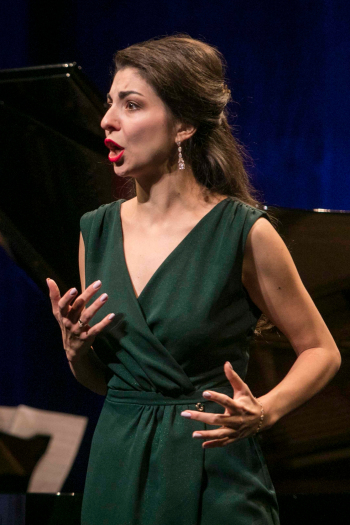 Mezzo-soprano Andżelika Wiśniewska together with pianist Paweł Sommer built a magical atmosphere by performing the aria "Wie Du warst! Wie Du bist!" by R. Strauss. The singer presented great German pronunciation, clear and suspenseful interpretation and musical sensitivity. As the second piece, the jury members chose W.A. Mozart’s "Ah scostati / Smanie implacabili". The soloist presented Dorabella's emotional vibrations vigorously and with commitment. Only with soaring phrases in forte dynamics her voice sounded a little less at ease.
Mezzo-soprano Andżelika Wiśniewska together with pianist Paweł Sommer built a magical atmosphere by performing the aria "Wie Du warst! Wie Du bist!" by R. Strauss. The singer presented great German pronunciation, clear and suspenseful interpretation and musical sensitivity. As the second piece, the jury members chose W.A. Mozart’s "Ah scostati / Smanie implacabili". The soloist presented Dorabella's emotional vibrations vigorously and with commitment. Only with soaring phrases in forte dynamics her voice sounded a little less at ease.
Wiktoria Wizner | mezzo-soprano
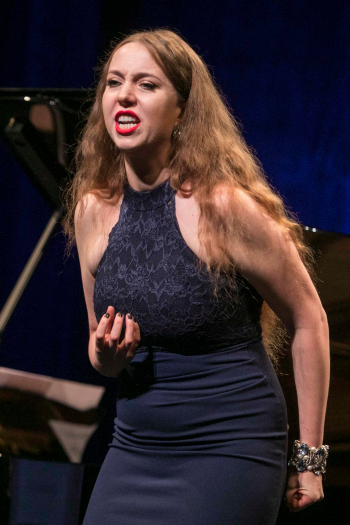 Exactly the same repertoire as the predecessor was performed by mezzo-soprano Wiktoria Her German pronunciation was not perfect and there was no legato. Aria and recitative "Ah! Scostati / Smanie implacabili", the soloist, decided to perform forte in a uniform dynamic, to the disadvantage of interpretation.
Exactly the same repertoire as the predecessor was performed by mezzo-soprano Wiktoria Her German pronunciation was not perfect and there was no legato. Aria and recitative "Ah! Scostati / Smanie implacabili", the soloist, decided to perform forte in a uniform dynamic, to the disadvantage of interpretation.
Karolina Zdrojkowska-Pytlak | soprano
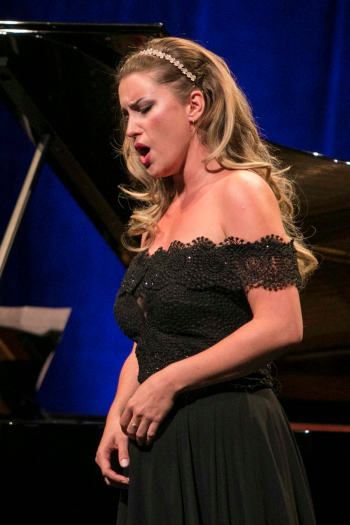 Soprano Karolina Zdrojkowska-Pytlak performed the pieces "Ecco, respiro appena / Io son l'umile ancella" by F. Cilèa and "Crudele! Ah no, mio bene! / Non mi dir, bell’idol mio" by W.A. Mozart. The soloist presented herself beautifully on stage. In her interpretation one could hear sensitivity and understanding of the presented pieces. The voice, however, was not very controlled and the singer had problems with intonation.
Soprano Karolina Zdrojkowska-Pytlak performed the pieces "Ecco, respiro appena / Io son l'umile ancella" by F. Cilèa and "Crudele! Ah no, mio bene! / Non mi dir, bell’idol mio" by W.A. Mozart. The soloist presented herself beautifully on stage. In her interpretation one could hear sensitivity and understanding of the presented pieces. The voice, however, was not very controlled and the singer had problems with intonation.
Sylwia Ziółkowska | soprano
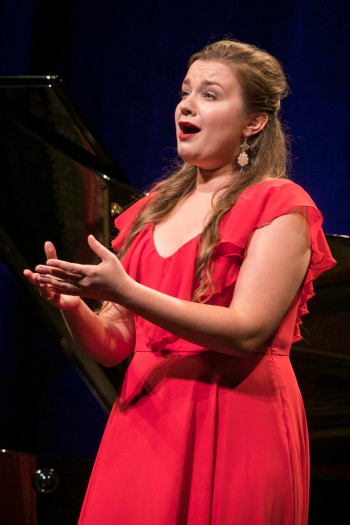 Intimate atmosphere was created by the soprano Sylwia Ziółkowska in S. Rachmaninov’s song Nie poj krasavica. The soloist sang it with a delicate sound and interpreted the lyrics in an interesting way. There were no dynamic differences because forte and piano sounded too similar. As the second piece the Jury members chose W.A. Mozart’s aria Tiger! Wetze nur die Klauen. The singer interpreted this aria intelligently and with commitment, but her voice did not sound dense enough in the more dramatic moments.
Intimate atmosphere was created by the soprano Sylwia Ziółkowska in S. Rachmaninov’s song Nie poj krasavica. The soloist sang it with a delicate sound and interpreted the lyrics in an interesting way. There were no dynamic differences because forte and piano sounded too similar. As the second piece the Jury members chose W.A. Mozart’s aria Tiger! Wetze nur die Klauen. The singer interpreted this aria intelligently and with commitment, but her voice did not sound dense enough in the more dramatic moments.
Chaoran Zuo | tenor
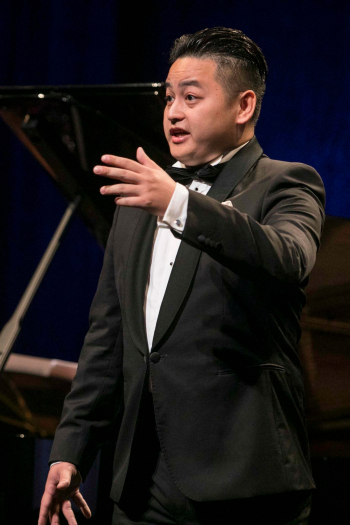 Chinese tenor Charoan Zuo started his performance with G. Donizetti’s aria "Ah! Mes amis". The soloist seemed very confident and boldly made eye contact with the audience. He bravely attacked the breakneck, repeated high C’s. In the midrange, the soloist had a problem with intonation. He sang W.A. Mozart’s aria "Ah lo veggio quell’anima bella" gracefully, but here too there were errors in intonation.
Chinese tenor Charoan Zuo started his performance with G. Donizetti’s aria "Ah! Mes amis". The soloist seemed very confident and boldly made eye contact with the audience. He bravely attacked the breakneck, repeated high C’s. In the midrange, the soloist had a problem with intonation. He sang W.A. Mozart’s aria "Ah lo veggio quell’anima bella" gracefully, but here too there were errors in intonation.
Adriana Banásová | soprano
Justyna Bluj | soprano
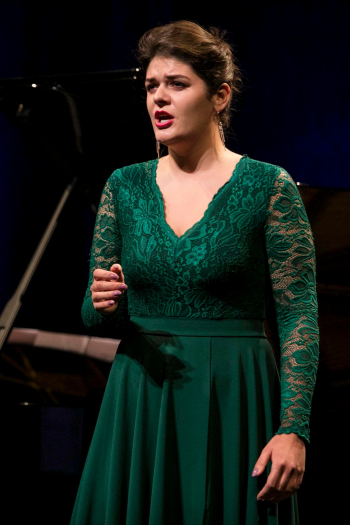 Soprano Justyna Bluj beautifully performed the aria and recitative "Celui don’t la parole / Il est doux, il est bon" by J. Massenet. She sang effortlessly, in a strong, confidently guided voice. She showed an interesting interpretation and an impressive piano. Some of the consonants were inarticulate. She started her second aria, W.A. Mozart’s "Porgi amor", very delicately, which made her voice sound less supported. She also had a problem approaching high notes.
Soprano Justyna Bluj beautifully performed the aria and recitative "Celui don’t la parole / Il est doux, il est bon" by J. Massenet. She sang effortlessly, in a strong, confidently guided voice. She showed an interesting interpretation and an impressive piano. Some of the consonants were inarticulate. She started her second aria, W.A. Mozart’s "Porgi amor", very delicately, which made her voice sound less supported. She also had a problem approaching high notes.
Robin Červinek | baritone
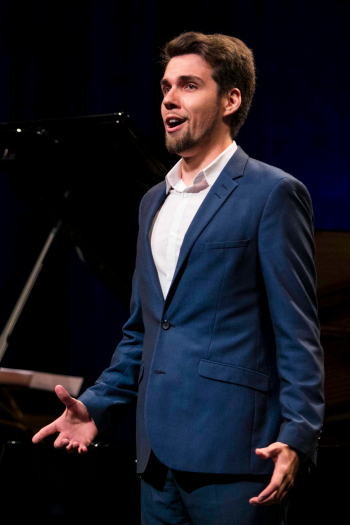 Czech baritone Robin Červinek started his performance with W.A. Mozart's aria "Rivolgete a lui lo sguardo", and then he performed the aria "Bella siccome un angelo" by G. Donizetti. It was evident that the soloist had a well-thought-out interpretation. He presented great diction and secure, resonant high notes. The lower register was less audible and sounded out of tune at times.
Czech baritone Robin Červinek started his performance with W.A. Mozart's aria "Rivolgete a lui lo sguardo", and then he performed the aria "Bella siccome un angelo" by G. Donizetti. It was evident that the soloist had a well-thought-out interpretation. He presented great diction and secure, resonant high notes. The lower register was less audible and sounded out of tune at times.
Ketevan Chuntishvili | soprano
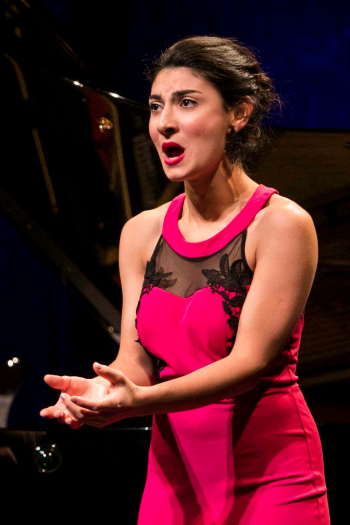 Georgian soprano Ketevan Chuntishvili presented the pieces "Je marche sur tous les chemins / Obéissons quand leur voix appelle" by J. Massenet and "E Susanna non vien / Dove sono" by W.A. Mozart with great ease. The soloist adjusted the dynamics and color of the voice to the carefully thought out in every detail interpretation. She showed a whole range of emotions. Her voice sounded sonorous and enchanted with a beautiful timbre.
Georgian soprano Ketevan Chuntishvili presented the pieces "Je marche sur tous les chemins / Obéissons quand leur voix appelle" by J. Massenet and "E Susanna non vien / Dove sono" by W.A. Mozart with great ease. The soloist adjusted the dynamics and color of the voice to the carefully thought out in every detail interpretation. She showed a whole range of emotions. Her voice sounded sonorous and enchanted with a beautiful timbre.
Shira Cohen | soprano
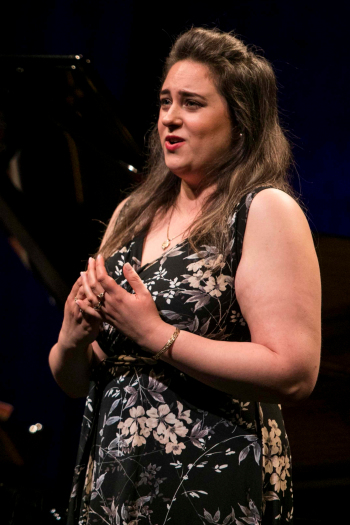 Shira Cohen, an Israeli-Czech soprano, started her performance with an emotional interpretation of C. Menotti’s aria "What a curse for a woman / Steal me". She presented great diction and a very good stage expression. The Jury members chose W.A. Mozart’s "Porgi amor" as the second aria. The soloist's voice sounded less confident than in the first aria. An intense vibrato set out, and the top register was not sounding comfortable.
Shira Cohen, an Israeli-Czech soprano, started her performance with an emotional interpretation of C. Menotti’s aria "What a curse for a woman / Steal me". She presented great diction and a very good stage expression. The Jury members chose W.A. Mozart’s "Porgi amor" as the second aria. The soloist's voice sounded less confident than in the first aria. An intense vibrato set out, and the top register was not sounding comfortable.
Dominika Dobrolińska | soprano
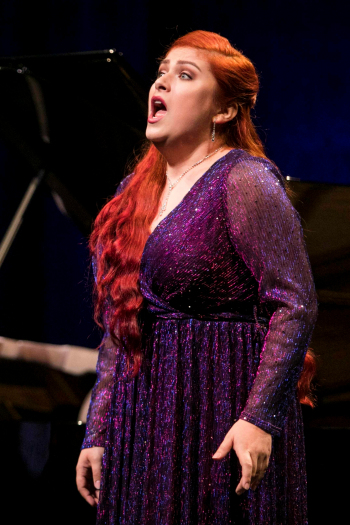 Dominika Dobrolińska began her performance with aria and recitative "Ah! Tardai troppo / o luce di quest’anima" by G. Donizetti. She sang gracefully in a well-guided voice. Unfortunately, her interpretation lacked a more thoughtful presentation of the text. The second aria, "Durch Zärtlichkeit und Schmeicheln" by W.A. Mozart was more suited to her timbre. It also seemed that she felt more at ease with this piece, which made the performance more expressive.
Dominika Dobrolińska began her performance with aria and recitative "Ah! Tardai troppo / o luce di quest’anima" by G. Donizetti. She sang gracefully in a well-guided voice. Unfortunately, her interpretation lacked a more thoughtful presentation of the text. The second aria, "Durch Zärtlichkeit und Schmeicheln" by W.A. Mozart was more suited to her timbre. It also seemed that she felt more at ease with this piece, which made the performance more expressive.
Adrian Domarecki | tenor
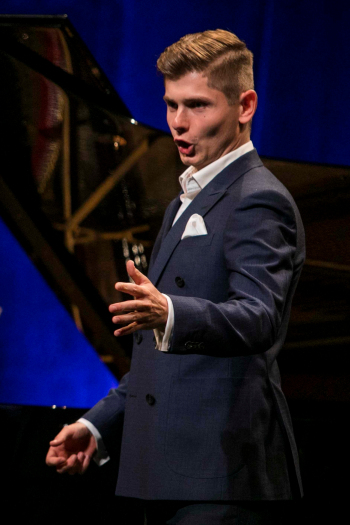 Tenor Adrian Domarecki started his performance with a brilliant performance of the recitative and aria "Lunga da lei / De miei bollenti spiriti" by G. Verdi. He presented a well thought-through interpretation and great diction. He built musical phrases with ease, and his voice sounded confident in all registers. The Jury members chose W.A. Mozart’s aria "Il mio tesoro" as his second piece. The soloist subordinated each musical phrase to the emotions he conveyed. Even the coloratures were sung with expression. At times, there was too much emotion in the voice, which resulted in a less free sound.
Tenor Adrian Domarecki started his performance with a brilliant performance of the recitative and aria "Lunga da lei / De miei bollenti spiriti" by G. Verdi. He presented a well thought-through interpretation and great diction. He built musical phrases with ease, and his voice sounded confident in all registers. The Jury members chose W.A. Mozart’s aria "Il mio tesoro" as his second piece. The soloist subordinated each musical phrase to the emotions he conveyed. Even the coloratures were sung with expression. At times, there was too much emotion in the voice, which resulted in a less free sound.
Olga Dyadiv | soprano
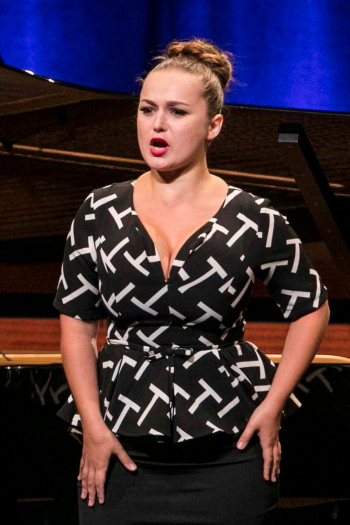 Ukrainian coloratura Olga Dyadiv performed the pieces "En proie à la tristesse" by G. Rossini and "Dal tuo gentil sembiante" by W.A. Mozart. The singer has impressive and saturated high notes, while the other registers are less sonorous. This prevents her from dynamically differentiating her singing. The soloist delivers the text well and has an interesting expression.
Ukrainian coloratura Olga Dyadiv performed the pieces "En proie à la tristesse" by G. Rossini and "Dal tuo gentil sembiante" by W.A. Mozart. The singer has impressive and saturated high notes, while the other registers are less sonorous. This prevents her from dynamically differentiating her singing. The soloist delivers the text well and has an interesting expression.
Paulina Dybowska | mezzo-soprano
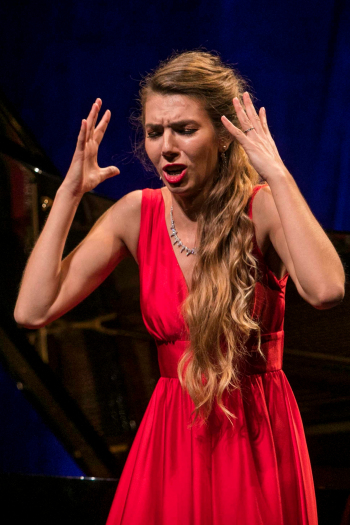 Pieces "Fia dunque vero / O mio Fernando" by G. Donizetti and "Ah! Scostati / Smanie implacabili" by W.A. Mozart were sung by mezzo-soprano Paulina Dybowska. The soloist presents herself gracefully on stage. Her voice has a warm timbre with nice sounding lower notes. There is air in the higher registers and one can notice some problems with intonation.
Pieces "Fia dunque vero / O mio Fernando" by G. Donizetti and "Ah! Scostati / Smanie implacabili" by W.A. Mozart were sung by mezzo-soprano Paulina Dybowska. The soloist presents herself gracefully on stage. Her voice has a warm timbre with nice sounding lower notes. There is air in the higher registers and one can notice some problems with intonation.

